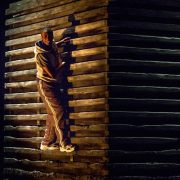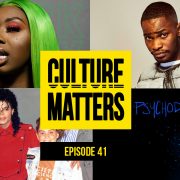Arinzé Kene – The Award Winning Playwright Returns To The Stage with good dog

good dog, written by Award Winning playwright Arinzé Kene, has made a return to the stage for the Spring season. The play offers a captivating and poignant interrogation into London’s cultural health. Though it’s set in an early 2000’s context, the play is more than relatable today. good dog explores the significance of multi-cultural community, in a (almost) pre-gentrification London. good dog poses the question, do good things happen to good people? Or, is injustice just a part of life?
I spoke to Arinzé Kene to find out more.
In your own words, what is good dog about?
“It’s about this kid who thinks that in life, being ‘good’ will mean that your life is going to be ‘good’, and good things will happen to you. It’s what we’re taught, it’s one of those old traditions that we grow up believing; that good things happen to good people.
As he grows up, and realises that actually that’s not how it works, life is more complicated than that. We watch him deal with it, he has to build a new approach to life. It’s not about what you do, it’s about when something bad happens to you, you have to pass on that feeling to someone else.
good dog is also about the people around him, who are trying to be good, trying to live honest lives, be ‘a-class’ citizens.
But, what I really enjoyed when writing it, was watching these characters and the different ways they deal with angst, with stress. When something bad happens in their lives, while you were just trying to be good in the first place. That’s what we see throughout the play; that it’s not always a fair world!”

Who or what inspired you to begin writing?
“On stage, I’m inspired by August Wilson, Debbie Tucker Green. I’m also a big fan of Max Frisch, Eugene Ionesco. I love to play around with absurdity in my writing both on screen and stage, so I’m also inspired by artistry – Salvador Dali, or this filmmaker called Luis Buñuel who creates surrealistic films. I’m also a big fan of KAFTA, and Charlie Kaufman, who wrote Adaptation.”
Despite being initially set in the 00s, how are the themes explored within the play still relevant in the current political & social climate?
“Well, the play starts in the noughties, and goes right up to 2011 – which was during the London riots, and then a little bit beyond to around 2012.
I don’t know how much the world has really changed in that time. The community that I’ve written about in that period, has become more gentrified, so if I were to write the play today, it would be a completely different vibe.
Some people would argue that we’ve actually regressed politically and socially maybe. Some of the things that have been happening, for example Brexit, the election of Donald Trump, what’s happening in Russia, Brazil and around the world. The things that are happening in our lifetime, you would never think to actually happen.
But, jumping back to the noughties – I love to be nostalgic sometimes. This kid is having a rough time, but some would say those were the good old days – when there was a sense of community, when people could walk down the street and say ‘Hi, Mrs Johnson’, for example. Now, we don’t really know our neighbours that well because London is so expensive – they come and go.
But to answer your question – I don’t think there’s been a massive change from then to now. Some of the social or racial tensions amongst communities that are discussed in the play, are still relevant today.”
How would you encourage young people to get involved with theatre?
“I would say to start where you are. When I was starting out, I was getting involved with whichever company would have me. There’s companies that offer initiatives for young people, (by young I mean 18-26), such as the Young Vic, The Old Vic, The Hammersmith Lyric, the young writers at the Royal Court, Soho writers hub, Young Vic directors. There’s all sorts of initiatives for young people who want to get into writing, directing and performing.
All you have to go is go onto the various sites, and go to the taking part/development sections. And if it’s not clear you can always run down to the theatre and just say ‘hey, can I speak to someone in development, I’m a young writer/actor/director’ and they will send someone down to speak to you.”
Have any of your plays been produced this way?
“Yeah, so my first play Estate Walls was put on at the Royal Court while I was on the Young Writers programme. The play later went on to Oval House theatre. Also, when I was apart of the Soho Six, God’s Property was put on at Soho Theatre, and because Estate Walls was on at the Oval House at the same time they asked me to write something for the Under 21s company there – called suffocation. This went on to be my first commissioned play.
So things do come of these initiatives. The amount of experience I gained, from assistant directing, working with these experts was great.”

Do you think that good things happen to good people?
“I don’t think life works that way. I think there are some things that we have no control over in this life.
I’m a little bit of a Kantist (Imannuel Kant), who believed that we shouldn’t seek pleasure in a hedonistic way. We shouldn’t just strive to feel good all the time. Instead, we should focus on being the best version of us that we can be – using our rationale and our consciousness. We should use that in order to just improve ourselves if anything in order to help people with the process, instead of for ourselves or for the end product.
I just try to do my best, that’s why I’m on this Earth. And that’s why I don’t think that doing good things means good things happens to you. I don’t believe that’s the order, or the way the world should be.”
The last few shows of this year’s run will be till the 23rd at Bernie Grant Arts Centre.
https://www.berniegrantcentre.co.uk/see/good-dog/
Also, check out the Black Ticket Project – for free tickets for BAME individuals.




![ZINO VINCI’S ‘FILTHY & DISGUSTING’EP BRINGS YOU TO THE CORE OF THE ARTIST [@ZinoVinci]](https://guap.co/wp-content/uploads/2023/10/Zino-4.jpg)





![Remel London’s [@Remel_London] “Mainstream” is a must attend for upcoming presenters!](https://guap.co/wp-content/uploads/2017/02/REMEL-LONDON-FLYER-FINAL-YELLOW-COMPLETE-1.png)